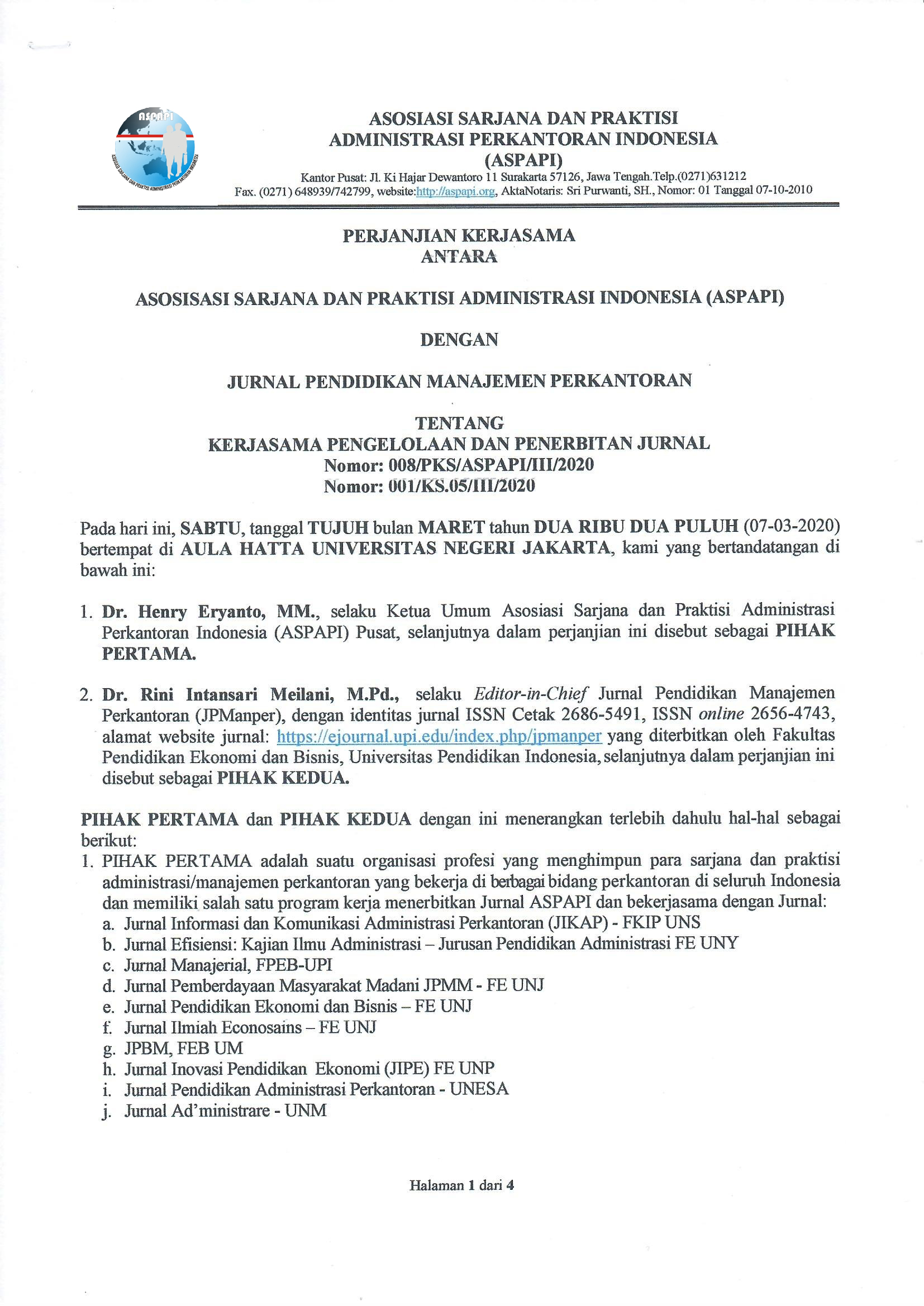UPAYA PENIGKATAN PRESTASI BELAJAR SISWA DENGAN DISIPLIN KERJA GURU
Abstract
Tujuan dari setiap pembelajaran adalah prestasi belajar. Peningkatan prestasi belajar dapat ditingkatkan dengan disiplin kerja guru. Mengacu pada teori konvergensi yang menghubungkan dua variabel, yaitu disiplin kerja guru dengan indikator kehadiran, tingkat kewaspadaan tinggi, ketaatan pada standar kerja, ketaatan pada peraturan kerja dan etika kerja. Prestasi belajar siswa dengan indikator pengetahuan, sikap dan keterampilan. Dengan penelitian explanatory survey, dan dengan teknik pengumpulan data melalui penyebaran angket menggunakan skala pengukuran likert. Teknik analisis yang digunakan dalam penelitian ini yaitu uji regresi linier sederhana. Hasil dari analisis data menunjukkan bahwa disiplin kerja guru berada pada kategori cukup tinggi dan prestasi belajar siswa berada pada kategori cukup tinggi. Hal ini menunjukkan bahwa salah satu faktor yang mempengaruhi prestasi belajar siswa adalah disiplin kerja guru.
Kata Kunci : disiplin kerja guru, prestasi belajar siswa
IMPROVEMENT EFFORTS THE STUDENTS’ LEARNING ACHIEVEMENT WITH THE TEACHERS’ WORKING DISCIPLINE
The objective of each study is student achievement, improving learning achievement can be improved by the teacher labor discipline. This research was based on the convergence theory that connected two variables, those are the teachers’ working discipline with some indicators attendance, high level of vigilance, fidelity on the working standard, fidelity on the working rule and working ethic. The students’ learning achievement with some indicators knowledge, attitude and skill. The research conducted was an explanatory survey, by distributing the questionnaire with a Likert-scale. The technique used to analyze the data was a simple regression linear test. The result of the data analysis showed that the teachers’ working discipline was on the high enough level and the students’ learning achievement was on the high enough level. This result pointed out that one of the factors that can influence the students’ learning achievement is the teachers’ working discipline.
Keywords: the teacher’s working discipline, the students’ learning achievement
Kata Kunci : disiplin kerja guru, prestasi belajar siswaFull Text:
PDFReferences
Anyon, Y. (2014). The Persistent Effect Of Race And The Promise Of Alternatives To Suspension. Children And Youth Services Review (44), 379–386.
Bradley, R. H & Corwyn, R. F. (2002). Socioeconomic Status And Child Development. Annual Review Of Psychology (53), 371-399.
Burden, P. R. (2003). Classroom Management. New York: John Wiley And Sons Inc.
Charles, MC. (2008). Building Classroom Discipline. Boston: Person Allyn And Bacon.
Charles,C,M. (2005). Building Classroom Discipline. San Diego: Gail W Senter.
Cummings, C. (2001). Strategies For Classroom Management. Virginia, USA: Teaching, Inc.
Dreikurs, R. (1968). Psycology In The Classroom. New York: Harper And Row.
Evertson, C. M., & Emmer, E. T. (1982). Effective Management At The Beginning Of The School Year In Junior High Classes. Journal Of Educational Psychology , 24 (4), 485-498.
Faisa, M. (2015). Associations Between Approaches To Study, The Learning. Journal Of Taibah University Medical Sciences , 10 (1), 56-65.
Geel, M. V. (2015). Assessing The Effects Of A School Wide Data Based Decision Making Intervention On Student Achievement Growth In Primary Schools. American Educational Research Journal , 20, 1-35.
Glewwe, P. (1996). The Relevance Of Standard Estimates Of Rates Of Return To Schooling For Education Policy: A Critical Assessment. Journal Of Development Economics , 51 (2), 267–290.
Gungor. (2014). The Relationship Between Personality Types And Self-Efficacy Perceptions Of Student Teachers In Procedia Social And. Classrooom Discipline , 786-790.
Gungor, S. (2014). Classrooom Discipline. Class Yonetimi .
Hanushek, E. A. (1971). Teacher Characteristics And Gains In Student Achievement:. American Economic Review , 2 (61), 280-288.
Hanushek, E. A. (2011). The Economic Value Of Higher Teacher Quality. Economics Of Education Review , 30 (30), 466-479.
Hanushek, Eric .A , Kimko, Dennis .D. (2000). Schooling, Labor-Force Quality, And The Growth Of Nations. American Economic Review , 90 (25), 1184-1208.
Ingersoll. (1996). Teacher's Decision-Making Power And School Conflict. Sociology Of Education , 2, 159-167.
Kamphuis. F & Moelands. F. (2000). A Student Monitoring System. Educational Measurement: Issues And Practice , 4 (19), 28-30.
Kornilova, Kornilov, & Chumakova. (2009). Subjective Evaluations Of Intelligence And Academic Self-Concept Predict. Learning And Individual Differences (19), 596-608.
Lewis. (1997). The Discipline Dilemma (2nd Ed.). The Australian Council For Educational Research .
Lott, J., & Kenny, L. W. (2013). State Teacher Union Strength And Student Achievement. Economics Of Education Review (35), 93–103.
Marzano. (2003). The Key To Classroom Management,. Educational Leadership , 6-13.
Okutan, M. (2006). Sinif Yonetiminde Ornek Olaylar. Pegema: Ankara.
Parr. J. M, Glasswell, K. & Aikman. M. (2007). Supporting Teacher Learning And Informed Practice In Writing Through Assessment Tools For Teaching And Learning. Asia-Pacific Journal Of Teacher Education, , 35 (1), 69e87.
Rosati, F. C & Rossi, M. (2003). Children's Working Hours And School Enrollment: Evidence From Pakistan And Nicaragua. World Bank Economic Review , 17 (2), 283–295.
Timperley, H & Alton-Lee A. (2008). Reframing Teacher Professional Learning Alternative Policy Approach To Strengthening Valued Outcomes For Diverse Learners. Review Of Research In Education , 32, 328-369.
Uglu, C. T. (2014). Time Management Class. Training Book.
DOI: https://doi.org/10.17509/jpm.v1i1.3388
Refbacks
- There are currently no refbacks.
Copyright (c) 2016 Jurnal Pendidikan Manajemen Perkantoran
Jurnal Pendidikan Manajemen Perkantoran View My Stats



